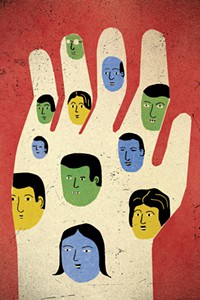Mending the Safety Net
Resource type: News
Urbanite Baltimore Magazine | [ View Original Source (opens in new window) ]
 THE BIG IDEA: Lower-class children are bombarded with obstacles to success, not the least of which are higher rates of asthma, poorer nutrition, and less than adequate access to medical care. “Kids aren’t going to learn and succeed in school if they aren’t feeling well,” says Dr. Gena O’Keefe, a senior associate at the Annie E. Casey Foundation. Still, successful programs like the Harlem Children’s Zone suggest that these children can flourish if they’re surrounded with a safety net of services.
THE BIG IDEA: Lower-class children are bombarded with obstacles to success, not the least of which are higher rates of asthma, poorer nutrition, and less than adequate access to medical care. “Kids aren’t going to learn and succeed in school if they aren’t feeling well,” says Dr. Gena O’Keefe, a senior associate at the Annie E. Casey Foundation. Still, successful programs like the Harlem Children’s Zone suggest that these children can flourish if they’re surrounded with a safety net of services.
THE BUZZ: Last year, inspired by the Harlem project, the federal government issued grants to nonprofits and higher education institutions in twenty-one cities to fund “cradle to career” services for underserved kids. Baltimore didn’t receive any of this Promise Neighborhood funding, but the competition helped spur related efforts under way across the city.
In East Baltimore, the nonprofit Elev8 offers an array of health services and programs for middle schoolers at four East Baltimore elementary/middle schools. The program, a partnership among East Baltimore Development Inc., Baltimore Medical System, the Johns Hopkins Center for Adolescent Health, and the Johns Hopkins University School of Nursing, targets middle schoolers because they “tend not to go to the doctor as much because they don’t need immunizations,” says Dr. Karen Donaldson, who makes weekly visits to three of the schools. “There can be medical problems that are often undetected.”
This health component is anchored by on-site health centers and suites, which are available to all students. At Collington Square School, for example, the one-room nurse’s office was expanded into a three-room health center with a full-time nurse. A doctor visits weekly to give physicals, immunizations, and hearing and vision tests and to help manage chronic conditions. In classrooms at Collington, a nurse and mental health specialist lead workshops on hygiene, obesity, anger management, and goal-setting. This year, reproductive and sexual health education will be added to the curriculum. Children can also enroll in after-school, summer, and mentoring programs. Elsewhere in the city, the University of Maryland works closely with the Furman L. Templeton Elementary School to offer a parent education program, a learning center for young children, weekly visits from a Breath Mobile for students with asthma, and soon, medical services. The Center for Urban Families and Living Classrooms Foundation also offer similar services at public and charter schools.
BUZZKILL: While Elev8 and other groups have received funding and attention for their recent efforts, many schools have already been offering wraparound services with fewer resources. “Every school should have a full-time school nurse at a minimum,” says Nicole Johnson, executive director of the East Baltimore Education Initiative. “[Elev8] definitely feels like it needs to make that case … [so] it’s proven on a local track record that these strategies work.”
Elev8 is an Atlantic Grantee.